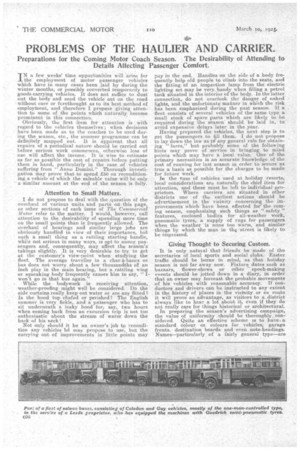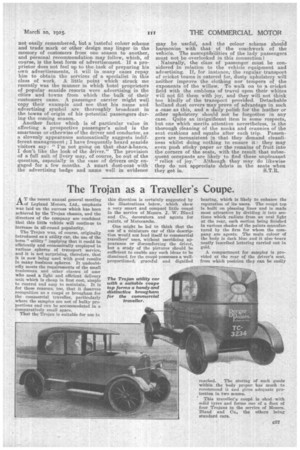PROBLEMS OF THE HAULIER AND CARRIER.
Page 20

Page 21

If you've noticed an error in this article please click here to report it so we can fix it.
Preparations for the Coming Motor Coach Season, The Desirability of Attending to Details Affecting Passenger Comfort.
IN a few weeks' time opportunities will `arise for the employment of motor passenger vehicles which have in many easeS been laid by during the winter months, or possibly converted temporarily to goods-carrying vehicles, it does not suffice to dust out the body and send the vehicle out on the rOad without care or. forethought as to its best method of employinent, and therefore I propose giving attention to some of the points which naturally become prominent in this connection.
Obviously, the first item for attention is with regard to the vehicles themselves; when decision's have been made as to the coaches to be used during the season, etc., the summer programme can be definitely mapped out. It is apparent that all repairs of a periodical nature should be carried out before. serious work commences, otherwise loss of use will affect the ineome. It is wise to estimate as far as possible the cost of repairs before putting. them in hand, particularly in the case of vehicles suffering from "Anne Domini." Thorough investigation May prove that to spend £50 on reconditioning a vehicle of which the saleable yalue will be only a similar amount at the end of the season is folly.
Attention to Small Matters.
I do not propose to deal with the question of the overhaul of various units and parts on this page, as other sections of each issue of Tke Commercial :110tor refer to the matter. I Would, however, call attention to the desirability of spending more time on the small points than is frequently allowed. The overhaul of bearings and similar large jobs are obviously handled in view of their importance, but such a small thing as a rattling starting handle, while not serious in many ways, i5 apt to annoy passengers and, consequently, may affect the season's takings slightly. It is very desirable to try to get at the customer's view-point when studying the fleet. The average traveller in a char-hebancs or bus does not worry about a few thousandths of an inch play in the main bearing, but a rattling wing or squeaking body frequently causes him to say, ". I. -won't go in that bus again..
While the bodywork is receiving attention, weather-proofing might well be considered. Do the side curtains really keep out water or are any fitted ? Is the hood top chafed or perished? The English slimmer is very. fickle, and a passenger who has to sit underneath a leaky hoed for say, two hours when coming back from an excursion trip is not too enthusiastic about the stream of water down the back of his neck !
Not only should it be an owner's job to recOndition any vehicles IA may prepose to use, but the tarrying out of improvements in little points may pay in the end. Handles on the side of a body freauently help old people to climb into the seats, and the fitting of an inspection lamp from the electric lighting set may be very, handy when filling a petrol tank situated in the interior of the body. in the latter connection, do not overlook the danger of naked lights, and the unfortunate manner in which the risk has been emphasized during the past season. If a fleet consists of several vehicles of the same type a small stock of spare parts which are likely to be required during the season should be laid in, to avoid expensive delays later in the year. Having prepared the vehicles, the next step is to get the passengers to fill them. I do not propose to lay 'downthe law as.ter any general rule for obtaining fares," but probably some of the following hints' may prove or service in bringing to mind points which may have a local value. One of the primary necessities is an accurate knowledge of the cost of-running for last season in order to secure as true a basis as possible for the charges to be made for future work.
Iiithe tase of vehicles used at holiday resorts, local considerations are naturally the chief item for attention, and these must be left to individual proprietors. Where carriers are situated in other districts one of the earliest actions should be advertieement in the vicinity concerning the improvements which have been effected for the coming season, emphasizing such things as " safety " features, enclosed bodies for all-weather work, pneumatic tyres, a supply of rugs for passengers when the weather 'is none too warm, and similar things by which the man in 6Q-street is likely to be iMpressed.
"Giving Thought to Securing Custom.
It is only natmal that friends bemade of the secretaries of local sports and social clubs. Easter traffic should be borne in mind, as that holiday Beason is not far away now. Fixture dates such as bazaars, flower-shows or other epoch-making events should be jotted down in a diary, in order that an owner may forecast the probable movements of his vehicles with reasonable accuracy. If conductors and drivers can be instructed to any extent in the history of places in, the vicinity or en route it will prove an advantage, as visitors to a.district always like to hear a lot about it, even if they do not really care for things historical or architectural.
In preparing the season's advertising campaign, the value of uniformity ,should be thoroughly considered. Quite an effective scheme is to have a standard colour or colours for vehicles, garage fronts, destination boards and even note-headings. Naines-partieularly of a fairly general type—are not easily remembered, but a tasteful colour scheme and trade mark or other design may linger in the memory of customers from one season to another, and personal recommendation may follow, which, of course, is the best form of advertisement. If a proprietor does not feel up to the task of preparing his own advertisements, it will in many cases repay him to obtain the services of a specialist in this class of work. A little point which struck me recently was the manner in which hotel proprietors of popular seaside resorts were advertising in the cities and towns from which the bulk of their customers came. A passenger carrier might well copy their example and see that his name and advertising symbol are thoroughly broadcast in the towns of origin of his potential passengers during the coming season. Another factor which is of particular value in affecting a prospective passenger's mind is the smartness or otherwise of the driver and conductor, as a slovenly appearance automatically suggests indifferent management ; I have frequently heard seaside visitors say: "I'm not going on that char-h-hancs, I don't like the look of the driver." The provision of a full suit of livery may, of course, be out of the question, especially in the case of drivers only engaged for a few months. A smart dust-coat with the advertising badge and name well in evidence
may be useful, and the colour scheme should harmonize with that of the coachwork of the vehicle. The susceptibilities of the lady passengers must not be overlooked in this connection!
Naturally, the class of passenger must be considered in relation to the vehicle equipment and advertising. If, for instance; the regular transport of cricket teams is catered for, dusty upholstery will neither improve the clothing nor tempers of the exponents of the willow. To walk on to a cricket field with the emblems of travel upon their whites will not fill them with joy, and they will not think too kindly of the transport provided. Detachable holland dust covers may prove of advantage in such a -case as this, and a daily polish for the leather or other upholstery should not be forgotten in any case. Quite an insignificant item in some respects, but one which merits attention nevertheless, is the thorough cleaning of the nooks and crannies of the seat cushions and squabs after each trip. Passengers are inconsistent in that they demand cleanliness whilst doing nothing to ensure it: they may even push sticky paper or the remains of fruit into the corners of the seats, with the result that subsequent occupants are likely to find these unpleasant
relics of joy.' Although they may do likewise they do not appreciate debris in the seats when
they get in. S. T. R.




























